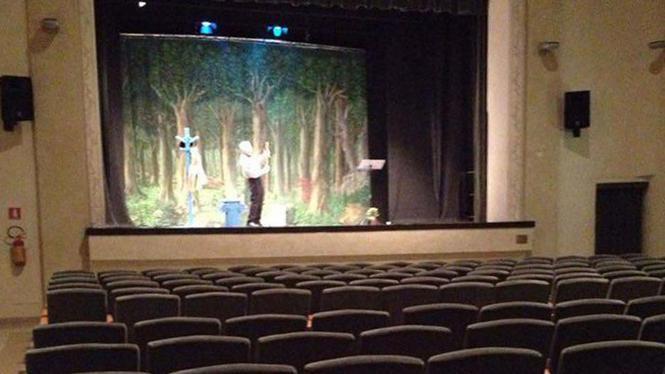
How Giovanni Mongiano played for empty seats and glorified his humiliation
Last week, Volkskrant journalist Iñaki Oñorbe Genovesi wrote about a remarkable Italian tragedy. The experienced 67-year-old actor Giovanni Mongiano planned on performing his monologue for 240 filled seats in a theatre in the North-Italian town Gallarate. Unfortunately, there was not one ticket sold for that night. At 9:00 p.m., the cash girl appeared in Mongiano's dressing room as the bearer of bad news, with no explanation why his show did not sell any tickets. Instead of going home defeated, he decided to recite his monologue ‘Improvvisazioni di un attore che legge’ (improvisations of a reading actor) anyway, while his assistant took a photo of the performance. It was the actor's ultimate declaration of love for his profession, ‘e' un questione di rispetto, per il pubblico e per il teatro’, he explained later.
In today’s society of the spectacle, everyone can be both actor and audience on the online stage that is exclusively measured in visibility, shareability and likeability. Mongiano seemed to oppose that culture, by doing exactly what he liked with no crowd present to praise him. His assistant, however, informed the local newspaper about the remarkable event. Not much later, a virtual applause started to greet him. On social media, the performance has been declared ‘il miracolo dii Gallarate’ (the miracle of Gallarate) by a dozen of directors, actors and theatre lovers from all over the world. ‘Congratulazioni lei è stato da esempio per tutti’, (Congratulations, you have been an example for everyone), wrote one of them. ‘Doing things that superficially make no sense, that's true art’, wrote another fan. According to them, Mongiano embodies the true actor, one that puts his own passion above commercial success.

Mongiano during his performance in Gallarate
Unfortunately, none of these voices were bodily present to support Mongiano in the actual space of the theatre. It seems that by performing for empty seats, he was not only paying his respects to the theatre but also displaying his concerns for a dying profession. For millennia, the theatre used to be at the heart of European culture, a place where people went to be seen. However, it is confronted with the unprecedented challenges of the rapidly evolving world nowadays. Electronic and digital technologies have given rise to a variety of media, from expensive 3-D movies to endless reality-TV shows, which all compete with the theatre for the attention of an audience that no longer needs to be physically present to be entertained.
Mongiano's monologue was articulated on the basis of having no power over this audience, while persistently holding on to his own dedication, pride and autonomy. His conflict points at the complicated and age-old relationship of the performing artist with the (in this case absent) eye of the beholder. It raises the question whether a play without an embodied audience has the right to exist at all. Since the evolution of theatre often correlates with the evolution of society, it seems unavoidable that the dynamics between a performer and his audience change due to the perception of daily life and its elusive character. Mongiano acted as an individual on a local scale, but his actions were eventually appreciated by a global audience. This way, he did receive an overwhelming applause, even though it didn't come in the traditional form of a standing crowd.
Blaming the empty seats on the audience, that seems to be lost in today’s culture of on-demand entertainment, is an understandable reaction. However, this common response also tends to lead to a fixation on the established cultural forms, while ignoring the possibilities of an unknown future. In times of decreasing funding, it seems a challenging task to protect a legacy while still enabling experimentation. We should not forget though, that the theatre world already seems to have changed more in the past decade or so than it did in the previous fifty years. To stay relevant in an increasingly competitive environment, embracing the new seems to be an unavoidable move.
Mongiano's conflict points at the complicated and age-old relationship of the performing artist with the (in this case absent) eye of the beholder.
By adopting digital technologies, theatre makers have shown exciting forms that enable audiences to engage in different ways with the stories told on a stage. As pointed out in The Economist: 'Streaming is less a threat than a hope, doing more than any other innovation to tackle the elitism and the lack of access that plague the performing arts today.' Instead of playing it safe, it could be more interesting to dive into these unknown digital realms, even if that means the absence of an embodied crowd and the presence of a camera instead.
Needless to say, I believe in the support of our rich theatrical heritage. The unique experience of attending a live performance should be cherished at all times and reinventing old standards seems to be a successful formula to accomplish that. Mongiano's solo performance and its online resonance embodied certain conflicts that are inherent to the theatre as a space, but also to the often confusing but exciting times we live in. Therefore, we should not mourn the empty seats and blame the absent audiences, but start looking at the many ways in which theatrical monologues can be turned into societal dialogues again.